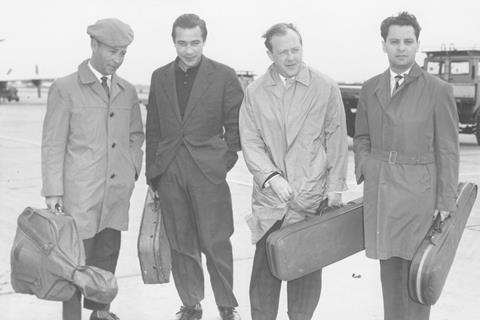The Borodin's founding first violinist, who played with the quartet for 30 years from 1945, was interviewed in The Strad shortly before his death in 1997

On having a unique voice
I've seen how young people are taught to think and feel music all in the same way. They learn to like fast tempos and to play metronomically. It becomes, in my opinion, very much like Socialist Realism of the Soviet Union. Or you could say it's like a modern supermarket. Every day you get the same food: very clean, very healthy and incredibly boring.
On tempo
When students first come to me and play a Beethoven quartet, they almost always work with one monotonous tempo, from the beginning through the whole movement. I try to explain to them that chamber music is like theatre, where there are different characters, different voices, different costumes.
In sonata-form allegros, the first and second themes should be thought of as Tempo I and Tempo II. Two images are presented - they could be a man and a woman. A lot of collisions happen in the music, like in a play and like in life. A monotonous tempo and a lack of variety in tone colour kill the music
On musical democracy
Forget about democracy in a string quartet. I believe very deeply that the first violinist should be a natural conductor. He or she has to know the piece before coming to the first rehearsal, and should have marked the score in detail - not only bowings, but even sometimes fingerings. Of course there will be discussions and arguments, but not at the first stage. The idea is to have all instruments sounding as one. That's what a string quartet is - one instrument with 16 strings, and more importantly, one mind.
The problem with quartets nowadays is that they consist of four independent, equal people. One person says one thing and another says something else. Then they'll say, 'Okay, okay. Let's check the metronome and see what the composer wrote. Let's play according to that tempo.' It gets settled, more or less, but the result is never a deep and personal performance.
Don’t misunderstand me: what is written is very important. But not in a formal way. Too much democracy in a quartet leads to too much objectivity. Of course, I'm sure many musicians will oppose what I have said. But I was brought up under different musical circumstances. There were musical traditions in Russia that even the Soviet regime could not destroy.
On dynamics
I tell my students to play very slowly, exaggerating the dynamics - piano more piano, forte more forte – with the idea they are performing this way on stage. Then they gradually come back to the normal tempo while keeping the same approach to the music. It gives tremendous results.
I got the idea from Sviatoslav Richter, with whom we used to play piano quintets. He'd say: 'Let's play piano, but pretending we are playing forte'. That is, put everything into the sound, but keep it piano. We'd do this before a concert. Then when we went on stage, suddenly we'd feel that our sound was very deep.
On competitions
Recently a student preparing for a competition came to my studio to play Paganini's Caprice no.17, with those famously difficult octaves. He played it so fast that I couldn’t hear the notes. And of course his technique was a bit affected by that - not exactly clean. So I said to him, 'Why so fast? It should be more devilish, like the image of Paganini. The student just smiled at me and said, 'You know, Mr Dubinsky, if I play it slower, they will kick me out of the competition after the first round'.
This article is an extract of an interview by David Rounds first published in The Strad's June 1995 issue








































No comments yet